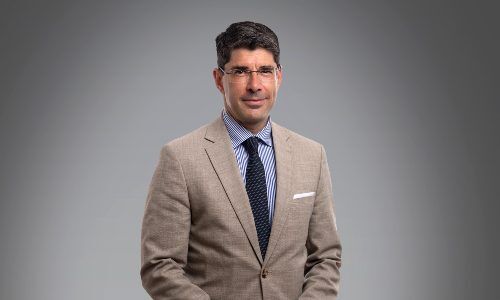Marc Palahi: «Why the Circular Bioeconomy Matters More Than Ever»
Global losses from environmental disasters are on the rise. In 2024, climate-related catastrophes cost the global economy approximately $320 billion. Addressing the challenge of financing innovative solutions to combat wildfires requires a multidimensional approach, writes Marc Palahi in his essay for finews.first.
In this section, authors comment on economic and financial topics.
Since the evening of Tuesday 7th January 2025, ferocious wildfires have raged across the Los Angeles area. Well over 100,000 people have been subject to mandatory evacuation orders, while early estimates have put the likely insured losses at $20 billion and the potential overall economic loss as high as $57 billion.
It is likely that last year’s heavy rains from the El Niño fuelled vegetation growth, which has since dried during a recent prolonged dry spell. Combined with strong winds, this has created the ideal conditions for wildfires to spread. The broader science is clear – climate change and today’s methods of landscape management are accelerating the wildfire risk globally.
«A key challenge in California»
As residential areas expand deeper into the wilderness, the risk to homes and businesses rises. Indeed, many homeowners caught up in the LA fires are without home insurance, after insurers had hiked costs or simply canceled provision altogether due to the escalating wildfire risk.
In addition to urban spread, climate change and the way we plan and manage our landscapes are thought to be the key factors. As temperatures rise, and droughts become more frequent, the tinderbox conditions that spark and spread wildfires are increasingly common.
Across the world, this new generation of wildfires is exceeding our capacity to suppress them. As we face mounting environmental, economic and social threats we must move from tactical suppression to holistic mitigation-adaptation strategies, to minimize the risk of extreme fires breaking out, and create resilient landscapes that are capable of recovering quickly should a fire occur.
Recent years have seen substantial scientific and technical advances in how land management practices can integrate prevention-preparedness, detection-response, and restoration-adaptation. Climate-smart forestry, for instance, which puts resilience and climate benefits at the forefront of forest management, is emerging as an effective tool for creating landscapes that are resilient to wildfires and other extreme weather events such droughts and floods. But key is how do we finance these strategies.
«As the bioeconomy grows, so does the economic opportunity»
Key to achieving this goal is the growth of the Circular Bioeconomy – in essence, by replacing today’s extractive, fossil-based economy with an economy based on nature’s regenerative power, we can cut the emissions that lead to global heating and reduce the risk of extreme weather events while attracting the necessary investments to transform landscapes and businesses in an integrated manner.
Forests and agroforestry, with their multifunctional role, offer a wide range of ecosystem services, and great opportunities to build this new economic model. New technologies are creating unprecedented opportunities to transform plant-based compounds into many of the fossil-based materials we use today.
Managing forests to produce these resources regeneratively also enhances the ecosystem services forests provide, improving carbon sequestration, soil health, and water retention, and reducing a forest’s susceptibility to fire. The same can be said for agroforestry and regenerative farming, which provide us with food while enhancing ecosystem services.
As the bioeconomy grows, so does the economic opportunity. In the Amazon alone, the bioeconomy could be worth up to USD 4 trillion, while globally the bioeconomy is expected to be valued at $7.7 trillion by 2030.
«Innovative financial tools will be needed»
For investors, the growth of the Circular Bioeconomy is creating an opportunity for private finance and public-private partnerships to target returns
However, to bring these and other mechanisms to scale, innovative financial tools will be needed. To do that, the finance industry needs to build a better understanding of the key role of nature as the true engine of our economy. Bringing scientific experts to the investment/finance industry needs to be the norm in the coming years.
In a world where losses from environmental disasters are growing – in total, climate disasters cost the global economy $320 billion in 2024. As we search for new ways to finance the fight against wildfires we must take a multi-faceted approach, integrating science, finance and policy to build a Circular Bioeconomy that addresses the root causes of extreme events.
Marc Palahi is the Chief Nature Officer at Lombard Odier Investment Managers.
Previous texts by: Rudi Bogni, Rolf Banz, Werner Vogt, Walter Wittmann, Alfred Mettler, Robert Holzach, Craig Murray, David Zollinger, Arthur Bolliger, Beat Kappeler, Chris Rowe, Stefan Gerlach, Nuno Fernandes, Richard Egger, Dieter Ruloff, Marco Bargel, Steve Hanke, Urs Schoettli, Maurice Pedergnana, Stefan Kreuzkamp, Oliver Bussmann, Michael Benz, Albert Steck, Martin Dahinden, Thomas Fedier, Alfred Mettler, Brigitte Strebel, Mirjam Staub-Bisang, Kim Iskyan, Stephen Dover, Denise Kenyon-Rouvinez, Christian Dreyer, Kinan Khadam-Al-Jame, Robert Hemmi, Anton Affentranger, Yves Mirabaud, Hans-Martin Kraus, Gérard Guerdat, Mario Bassi, Stephen Thariyan, Dan Steinbock, Rino Borini, Bert Flossbach, Michael Hasenstab, Guido Schilling, Werner E. Rutsch, Dorte Bech Vizard, Maya Bhandari, Jean Tirole, Hans Jakob Roth, Marco Martinelli, Thomas Sutter, Tom King, Werner Peyer, Thomas Kupfer, Peter Kurer, Arturo Bris, Frédéric Papp, James Syme, Dennis Larsen, Bernd Kramer, Armin Jans, Nicolas Roth, Hans Ulrich Jost, Patrick Hunger, Fabrizio Quirighetti, Claire Shaw, Peter Fanconi, Alex Wolf, Dan Steinbock, Patrick Scheurle, Sandro Occhilupo, Will Ballard, Nicholas Yeo, Claude-Alain Margelisch, Jean-François Hirschel, Jens Pongratz, Samuel Gerber, Philipp Weckherlin, Anne Richards, Antoni Trenchev, Benoit Barbereau, Pascal R. Bersier, Shaul Lifshitz, Ana Botín, Martin Gilbert, Jesper Koll, Ingo Rauser, Carlo Capaul, Markus Winkler, Thomas Steinemann, Christina Böck, Guillaume Compeyron, Miro Zivkovic, Alexander F. Wagner, Eric Heymann, Christoph Sax, Felix Brem, Jochen Möbert, Ursula Finsterwald, Michel Longhini, Stefan Blum, Nicolas Ramelet, Søren Bjønness, Gilles Prince, Shanu Hinduja, Salman Ahmed, Peter van der Welle, Ken Orchard, Christian Gast, Jürgen Braunstein, Jeffrey Vögeli, Fiona Frick, Stefan Schneider, Matthias Hunn, Andreas Vetsch, Mark Hawtin, Fabiana Fedeli, Kim Fournais, Carole Millet, Swetha Ramachandran, Thomas Stucki, Neil Shearing, Tom Naratil, Oliver Berger, Robert Sharps, Tobias Müller, Florian Wicki, Jean Keller, Niels Lan Doky, Johnny El Hachem, Judith Basad, Katharina Bart, Thorsten Polleit, Peter Schmid, Karam Hinduja, Zsolt Kohalmi, Raphaël Surber, Santosh Brivio, Mark Urquhart, Bruno Capone, Peter Hody, Agniszka Walorska, Thomas Müller, Ebrahim Attarzadeh, Marcel Hostettler, Hui Zhang, Angela Agostini, Guy de Blonay, Tatjana Greil Castro, Jean-Baptiste Berthon, Dietrich Grönemeyer, Mobeen Tahir, Didier Saint-Georges, Serge Tabachnik, Vega Ibanez, David Folkerts-Landau, Michael Welti, Mihkel Vitsur, Roman Balzan, Todd Saligman, Stuart Dunbar, Carina Schaurte, Birte Orth-Freese, Gun Woo, Lamara von Albertini, Ramon Vogt, Andrea Hoffmann, Niccolò Garzelli, Darren Williams, Benjamin Böhner, Mike Judith, Jared Cook, Henk Grootveld, Roman Gaus, Nicolas Faller, Anna Stünzi, Thomas Höhne-Sparborth, Fabrizio Pagani, Guy de Blonay, Jan Boudewijns, Sean Hagerty, Alina Donets, Sébastien Galy, Roman von Ah, Fernando Fernández, Georg von Wyss, Stefan Bannwart, Andreas Britt, Frédéric Leroux, Nick Platjouw, Rolando Grandi, Philipp Kaupke, Gérard Piasko, Brad Slingerlend, Dieter Wermuth, Grégoire Bordier, Gianluca Gerosa, Michael Bornhäusser, Christine Houston, Manuel Romera Robles, Fabian Käslin, Claudia Kraaz, Marco Huwiler, Lukas Zihlmann, Sherif Mamdouh, Harald Preissler, Taimur Hyat, Philipp Cottier, Andreas Herrmann, Camille Vial, Marcus Hüttinger, Serge Beck, Alannah Beer, Stéphane Monier, Ashley Semmens, Lars Jaeger, Shanna Strauss-Frank, Bertrand Binggeli, Marionna Wegenstein, George Muzinich, Jian Shi Cortesi, Razan Nasser, Nicolas Forest, Jörg Rütschi, Reto Jauch, Bernardo Brunschwiler, Charles-Henry Monchau, Nicolas Ramelet, Ha Duong, Teodoro Cocca, Jan Brzezek, Nicolas Mousset, Beat Weiss, Pascal Mischler, Andrew Isbester, Konrad Hummler, Jan Beckers, Martin Velten, Katharine Neiss, Claude Baumann, Daniel Roarty, Kubilaqy Yalcin, Robert Almeida, Karin M. Klossek, Marc Taverner, Charlie T. Munger, Daniel Kobler, Patrick Stauber, Anna Rosenberg, Judith Wallenstein, Adriano Lucatelli, Daniel Goleman, Val Olson, Brice Prunas, Frances Weir, Luis Maldonado, Francesco Magistra, Nadège Lesueur-Pène, Massimo Pedrazzini, Eric Sarasin, Dina Ting, Christopher Gannatti, Shaniel Ramjee, Mihkel Vitsur, Nannette Hechler-Fayd'herbe, Ralph Ebert, Mark Denham, Francesco Mandalà, Mariolina Esposito, Maryann Umoren Selfe, Dominique Gerster, Christian Kälin, Nadège Dufossé, Benjamin Melman, Brigitte Kaps, Florin Baeriswyl, Marc Reinhardt, Thomas Holderegger, Bruno Cavalier, Gary Burnison, Louise Curran, Adrian Cox, Philip Adler, Serge Fehr, Marc Lussy, Axel Brosey, Colin Vidal, Vivien Jain, Ralf Zellweger, Maria Vassalou, Nico Fiore, Gary Burnison, Thomas Signer, Brigitte Kaps, Andreas Ita, Leon Curti, Remo Badertscher, Alexis Marinof, Olivier Kessler, Beat Wittmann, Jacques Aurélien Marcireau, and Patricia Ordody.



























